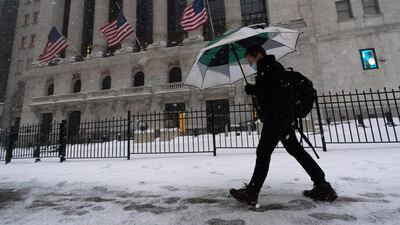It was a sluggish January for equity and forex markets, with the Dow Jones Industrial Average shedding more than 2 per cent and the S&P500 dropping 1.4 per cent over the course of the month. In the currency markets, the EUR/USD closed 0.84 per cent lower after hitting highs of 1.2350.
A lot of the weakness over the past month was a result of a stronger US dollar. The US Dollar Index, a measure of the value of the greenback against a weighted basket of major currencies, gained 0.68 per cent on the month after bouncing off 20-month lows. The ongoing pandemic concerns and the strain on global health systems to efficiently distribute Covid-19 vaccines also led to some of the selling pressure.
But perhaps one of the biggest factor driving stock markets down over the past few days was the trading tug of war between large groups of retail day traders and Wall Street institutions. The move in GameStop (GME) has been well-documented. After a group of Reddit users sparked a buying rally in the stock, hedge funds and other large financial institutions focused on short selling were forced to buy GameStop to balance the gamma as the losses in their GME put options escalated amid the buying frenzy. This drove up the price of GME further.
Many of these large institutions had to finance their GME losses by dumping other stock holdings to build more liquidity in their portfolios. While the short-squeeze move has largely played out and markets seem to be getting back to normal, attention has turned back to more promising vaccine news across both sides of the Atlantic and US President Joe Biden’s $1.9 trillion relief package.
The dispute between AstraZeneca and the European Union saw the drugmaker decide to cut its vaccine supplies to the bloc last month. The row over the vaccine supply chain spooked markets in January. However, at the start of February, a new resolution will see around 9 million additional doses being delivered to the EU in the first quarter, taking the total to 40 million. This is in addition to German Chancellor Angela Merkel targeting the end of summer to have all of Germany vaccinated.
The euro area has been particularly susceptible in January. Despite strong gains in euro area Purchasing Manager Indices (a key economic barometer in determining the direction of economic trends in the service and manufacturing sectors), the EUR/USD pairing has been under pressure over the past few weeks and now finds itself holding above 1.20 levels.
While the recovery in the euro area manufacturing sector is positive news, consumption still lags. We can expect continued positive developments around vaccine deployment and the upcoming US relief package to add more optimism to markets.
At the time of writing, bipartisan negotiations were still ongoing in Washington, but an announcement is imminent. Looking ahead, we have US non-farm payrolls due this Friday. Expectations are for new jobs added in the region of 50,000.
US earnings continue this week. At the time of writing, Amazon, Alphabet and Alibaba Group were yet to report, but we can expect stronger earnings to have a positive impact on US equity markets.
Finally, I am keeping an eye out for the Dubai Gold & Commodities Exchange’s GBP/USD contract. Currently trading below 1.37 levels, it has faced stiff resistance at 1.3760, a level it has consistently tested and failed over the past eight trading days. If there is a conclusive break of this level, we will then be exposed to 1.40 levels on the upside in the months ahead.
Gaurav Kashyap is a market strategist at Equiti Global Markets. The views and opinions expressed in this article are those of the author and do not reflect the views of Equiti


